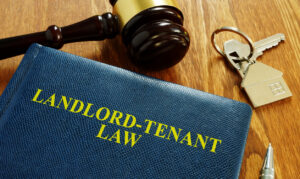In Massachusetts, landlords have a legal duty to maintain their property in a safe condition. When they fail to do that, and someone gets hurt, they can—and should—be held accountable.

Landlord Duty of Care Under Massachusetts Law
Massachusetts law places clear, enforceable responsibilities on landlords to keep their rental properties safe and habitable. These obligations are not just best practices—they’re written directly into state statutes and regulations.
- M.G.L. c. 186 § 15 requires landlords to keep all rented premises in compliance with state and local building and health codes. This includes ensuring that the property is structurally sound, free of safety hazards, and maintained in a condition suitable for human habitation. If a code violation exists—such as mold, exposed wiring, or a broken railing—and the landlord fails to address it, they may be legally liable if someone is injured as a result.
- M.G.L. c. 143 § 3T deals specifically with stairways, fire escapes, and exits in residential buildings. These features must be kept in safe, usable condition at all times. If a stairwell lacks proper lighting or a handrail gives way, and a tenant is injured, the landlord may be held responsible for violating their statutory duty.
- The Massachusetts Sanitary Code (105 CMR 410) sets the baseline requirements for residential safety and livability. It covers everything from having functional smoke detectors and secure locks, to proper ventilation, pest control, and the safe operation of heating and plumbing systems. This code also requires landlords to promptly address conditions that may pose a threat to a tenant’s health or safety—even if the tenant has not made a formal complaint.
In addition to these statutes, Massachusetts common law requires landlords to act as a reasonable person would under the circumstances. If a landlord knows—or should know—about a dangerous condition on the property, they have a legal obligation to repair or warn about it within a reasonable timeframe. Failing to do so isn’t just careless—it can be considered negligence, and tenants have the right to hold them legally and financially accountable.
Common Scenarios Where Landlords May Be Liable
There are many situations where clients are seriously injured due to unsafe conditions that could—and should—have been fixed. Examples include:
- Broken or poorly lit stairwells, violating M.G.L. c. 143
- Ceiling collapses due to ignored water damage or poor maintenance
- Defective locks or security features, leading to assault or injury
- Unshoveled snow and ice, especially in common areas, where courts have found landlords liable under the “mode of operation” theory
- Leaking pipes, mold growth, or warped floors that create slip hazards
- Failure to meet sanitary code requirements, including safe egress and structural integrity
Under Massachusetts law, even if the tenant didn’t complain, the landlord can be held liable if a reasonable inspection would have uncovered the danger.
Who’s Responsible for Injuries Inside the Apartment?
Responsibility depends on control and notice.
If the injury happened inside your unit, the landlord may still be liable if:
- You reported the issue and they failed to act
- The defect violated a building or sanitary code
- The issue was part of the building’s structure or systems (e.g., carbon monoxide alarms, electrical wiring, plumbing)
Courts in Massachusetts often look at whether the landlord had actual or constructive notice of the condition. If they ignored a known hazard, or failed to inspect reasonably, that can be grounds for liability.
What to Do If You’re Injured on a Rental Property
If you’re hurt on a rental property—whether in your unit or in a common area—take these steps:
- Seek medical care right away
- Report the incident in writing to your landlord or management company
- Take photos of the scene and your injuries
- Document your communications—texts, emails, repair requests
- Speak with a personal injury attorney
Massachusetts has a three-year statute of limitations for personal injury claims, but it’s important to act early while evidence is still fresh.
Landlord negligence cases in Massachusetts require a strong understanding of housing codes, building standards, and personal injury law. SUGARMAN has decades of experience with personal injury claims as a result of landlord negligence. If you have been injured and would like to speak to an attorney, call 617-542-1000, email , or fill out our contact form.
